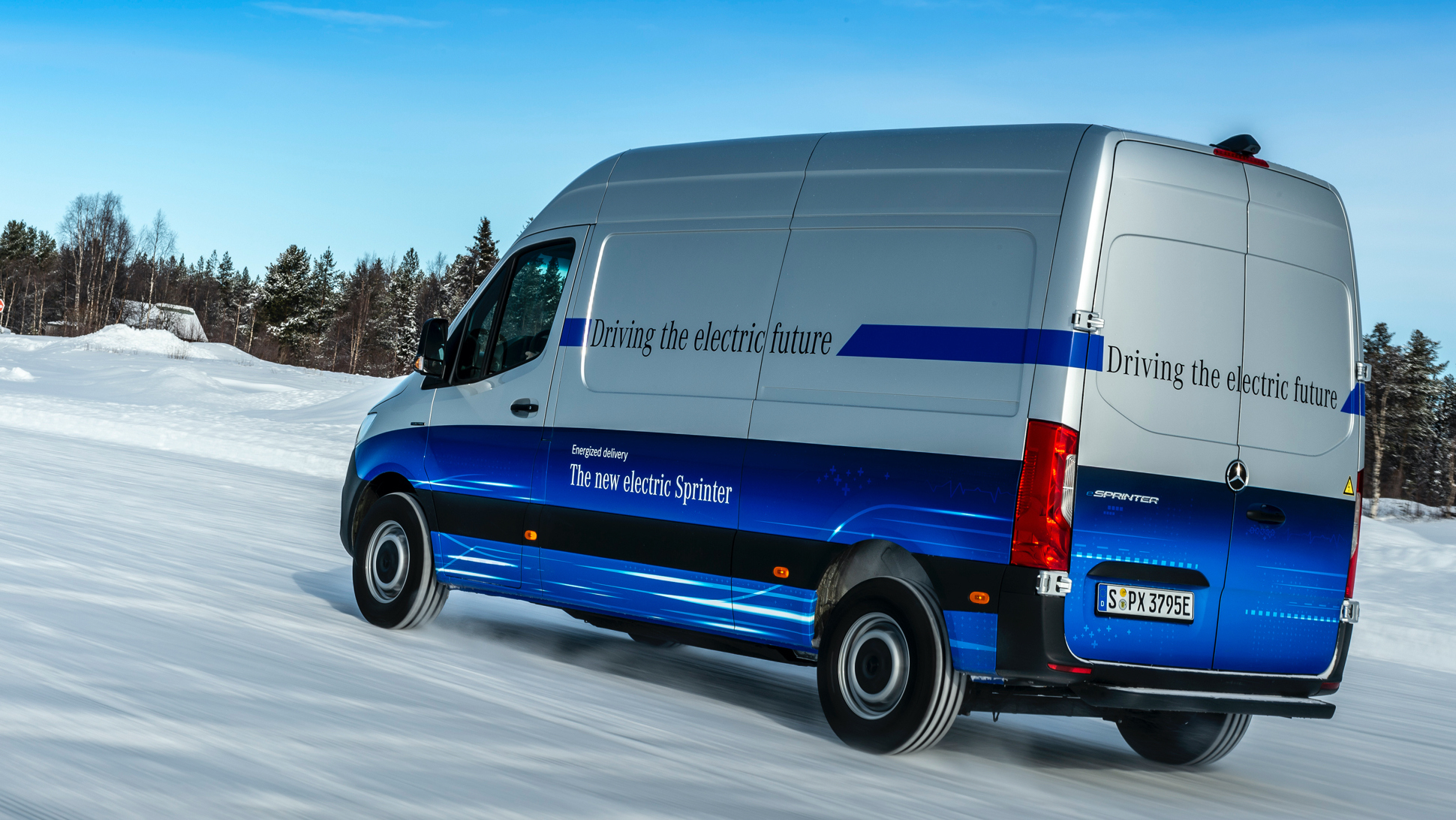

Mercedes-Benz is bringing its eSprinter electric commercial van to the United States as early as the third quarter of 2023, according to insider sources who spoke with Automotive News. American logistics companies have been clamoring for electric delivery vans, and thus, bringing it over is a no-brainer at this point.
The eSprinter also sounds far better than most of the proposals still in the hunt for the USPS’s $6 billion new-delivery-vehicle budget. Can we just quietly slip it or a similarly commercially-produced electric van into the conversation again?
The battery-electric eSprinter is already on sale in Europe, but Mercedes initially didn’t see the value in homologating it to the United States’ separate regulations and shipping it over with its relatively low range. Fortunately, the demand for vans like it argues otherwise. The U.S. electric light commercial vehicle market is expected to grow from about 56,000 sales per year now to about 623,000 by 2030, per industry analysts at Guidehouse Insights cited by Automotive News. A U.S. version would also beef up the eSprinter’s drivetrain, going from the current model’s 55 kilowatt-hour battery to a 120 kWh one, per Automotive News’ sources.
Delivery fleets tend to travel on similar routes every day, and most fleets have tight emissions targets to hit, making an EV a worthy option for making the rounds. It’s also nice not to have a noisy idle in residential areas. Many commercial fleets, including those of UPS and Amazon, already have sizable orders in for electric delivery vans. Frankly, it’s time for the United States Postal Service to follow suit.
The USPS has delayed their decision on a new delivery vehicle—which was recently delayed yet again—that even the proposals that are still in the running sound either outdated or a bit iffy. Ford and Oshkosh are offering a traditional internal-combustion-powered van, and there’s a plug-in hybrid van that’s been put forth by longtime USPS supplier Morgan Olson and its partner Karsan. The lone EV of the bunch is from startup Workhorse, who is partnering with fellow startup Lordstown Motors after their initial partner VT Hackney backed out of the deal.
While there are legitimate concerns over the newness of EV technology, the eSprinter is the electric version of Merc’s bare-bones work van. It’s more on par with fairly reliable simple EVs tech-wise than a luxury car with all kinds of bells and whistles. As Consumer Reports summed up when they downgraded a lot of luxury EVs, it’s the more complex ones that suffer from more reliability issues—not so much the simpler vehicles like the Chevrolet Bolt or the Nissan Leaf. With fewer moving drivetrain parts to fix and a few more years to work out the kinks, the eSprinter could be a viable choice.
As we wait…and wait………and wait for that $6 billion USPS contract to go somewhere, more USPS vehicles are getting up in years along with the occasionally combustible Grumman LLV fleet. It’s clear that there’s already a lot of USPS vehicles that shouldn’t wait until 2023 to be retired. For the others, it’s time to think ahead to an electric van like the eSprinter, the Ford e-Transit that’s coming in 2022, General Motors’ BV1 that starts production in September 2021, Rivian’s upcoming midsize van, or yes, even the Workhorse/Lordstown option that’s currently in the running—provided that Workhorse’s first van deliveries hold up in use.
The USPS has used internal-combustion-powered Sprinters, Ram ProMasters, Ford Transits, Mercedes-Benz Metrises and similar normal ol’ delivery vans rather often lately, so “buy some more vans” isn’t exactly a radical proposal. Earlier this year, the USPS ordered 17,300 Mercedes-Benz Metris and 7,100 Ram ProMaster vans to replace part of the Grumman LLV fleet, per Tire Meets Road. Jalopnik pointed out that the USPS has even figured out how to cover up the Metris’ Mercedes-Benz logos so as not to arouse suspicion from folks who might not know that a stripped-down work Metris isn’t a plush luxury vehicle.
While Mercedes already has a van factory in South Carolina, it is unclear if that is where they’ll build the USDM eSprinter, Automotive News notes. However, with a $1 billion upgrade coming to Merc parent company Daimler’s Vance, Ala., plant to build batteries and EVs, it certainly sounds plausible.
Sure, some longer rural routes may still need a more traditional drivetrain, or as we do now, a large right-hand-drive conversion pulley installed into a passenger car. Yet for most routes, an EV would be the better investment in the long run, with EVs’ lower operating costs. It’s good to see more momentum behind electric delivery vans, which means more competition, which means that companies will bring their A-game to all the companies who bring us parts.
Got a tip? Send us a note: tips@thedrive.com